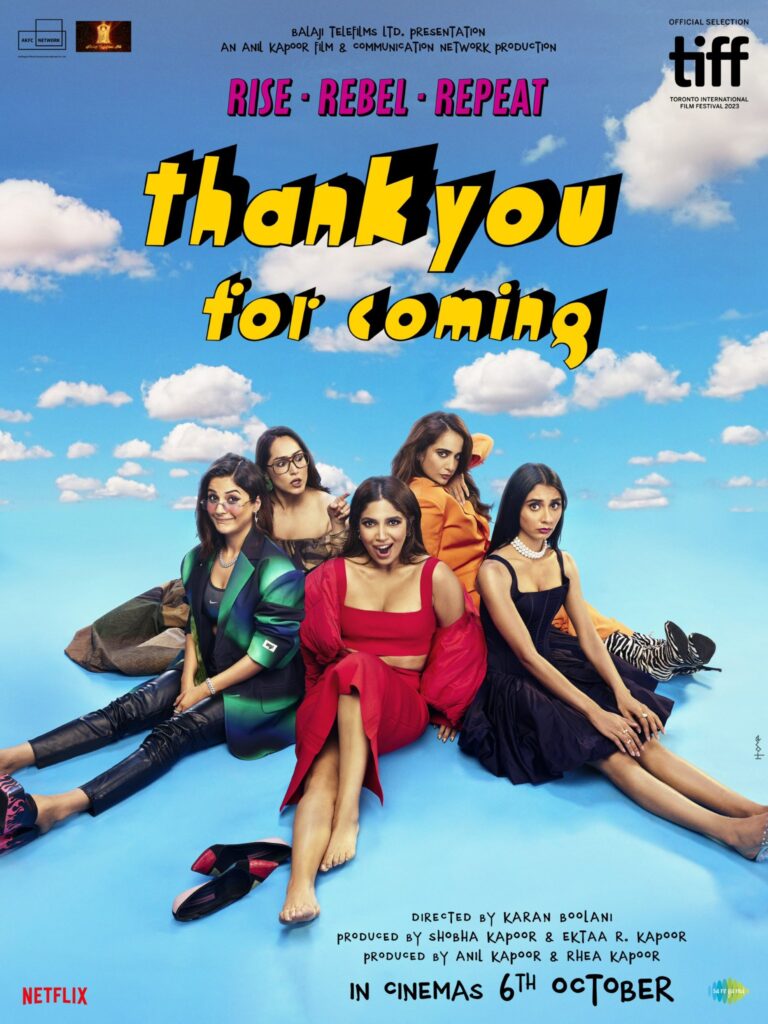A spiritual successor to 2018’s Veere di Wedding, I expected Thank You for Coming to have the same issues – crass humour with an attempt at being audacious about women’s sexuality but being too scared to actually dip its toes in that water. Surprisingly, Thank You for Coming manages to be terrible in a completely different way.
Thank you for Coming calls itself a comedy, but there isn’t much to laugh at unless you enjoy “non-veg” WhatsApp forwards that are loaded with terrible innuendoes. Towards the end of the film, Dolly Ahaluwalia refuses to laugh at a horribly crafted pun, and it almost feels like the actress is overcome with a feeling of regret for having ever signed the film. Shibani Bedi seductively drawling, “Jaa Simran jaa, jeele apni zindagi”, made me feel the same.

Thank You for Coming also tries to position itself as a feminist film that puts women’s feelings and pleasure at the forefront. The climax has Bhumi Pednekar screaming “Smash the patriarchy!” at the top of her voice. It comes across as nothing more than a disingenuous attempt at virtue baiting a liberal audience into celebrating it for its openness. In fact, it seems that the filmmakers were so impressed with themselves for daring to push the envelope that far after Swara Bhasker’s controversy following Veere that they even slipped in a meta dialogue about it. But the film never really puts the onus of female pleasure on their partners – instead ending with the message that (spoiler alert) women should take the matter quite literally into their own hands. In their desperate but sorry attempt to ‘smash the patriarchy’, Thank You for Coming’s writers Radhika Anand and Prashasti Singh chicken out when it comes to calling out the role men play in establishing and perpetuating its norms.
I was ready to forgive the film in the first half – sure it wasn’t an Oscar worthy masterpiece and the jokes didn’t land, but the other people with me in the theatre hall were enjoying themselves. The second half, however, felt like a completely different film. After the interval, Thank You for Coming decides to become a drama about female friendship and the simultaneous sexualisation and slut-shaming that all women are subject to. The tonal shift comes out of nowhere and is so incredibly jarring that it leaves the audience uninterested and bemused. While people were still cackling at sex puns and hooting for Anil Kapoor in the first half, the second half had them having entire video calls in the middle of the film.

It is also very obvious that Thank You for Coming was directed by Karan Boolani – a man. All issues are covered in a manner so shallow that you would have a better understanding of what women are upset about after going through a carousel on an Instagram page. The cast is also underwhelming. Bhumi Pednekar overperforms throughout the film, which doesn’t help the fact that her character is one of the most unlikable protagonists I have ever come across. Characters keep telling her that life is defined by nothing but her own choices, yet she continues making the worst decisions – alienating her friends, her family, and her audience. The other members of the cast, Shibani Bedi, Dolly Singh, Shehnaaz Gill, and Kusha Kapila, are given characters that are nothing but extensions of their online personas. Had Thank You for Coming not been marketed internationally as a feminist coming of age film, I would have believed Luv-Ranjan wrote it based on how annoying and shallowly crafted the female characters are.
Thank you for Coming is particularly disheartening because we are in desperate need of films that candidly explore women’s desires and needs. Instead what we are offered is a film so excited about the fact that it can show vibrators on screen that its creators seem to have overlooked the significance of crafting a compelling narrative. I look forward to the day when we can enjoy more substantial films in this genre.

